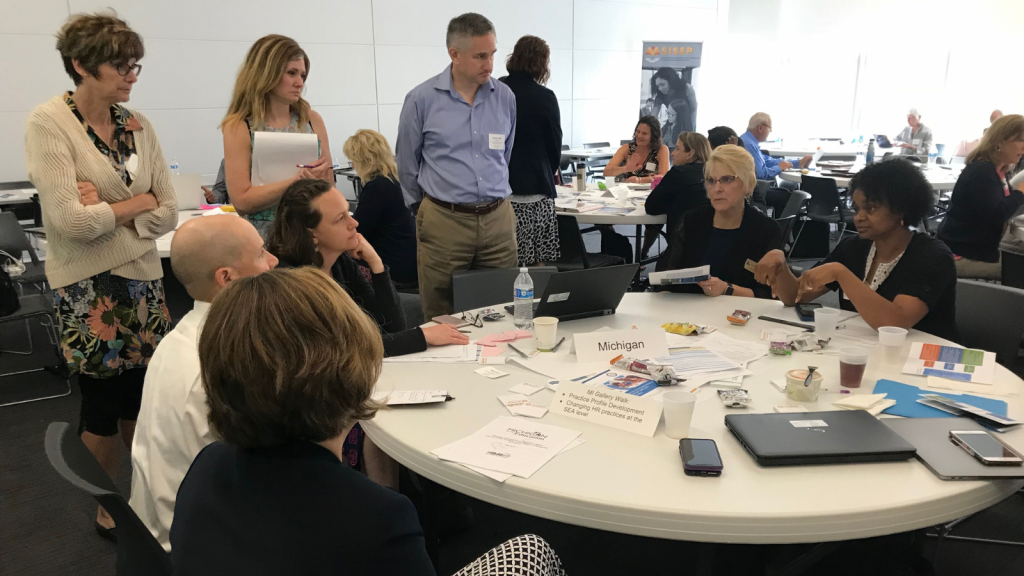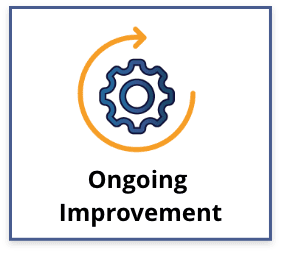Dive Deeper: Read
A Practice Guide to Support Implementation – What competencies do we need?
The Practice Guide to Supporting Implementation identifies the competencies that implementation support practitioners need to support the effective implementation and scaling of evidence-informed practices, programs and policies, to improve outcomes for people and communities.
Brief: The Case for Implementation Support Practitioners in Education
Excitement is brewing for radical change in education. In a time when many are bemoaning the difficulties we are facing, others are developing creative new ways to reimagine education and design transformational systemic changes to support teachers and ultimately realize our best outcomes for ALL children. Read more about how implementation can be part of the reimagining.
Building Bridges: Brokering in Education
SISEP Blog: Building Bridges: Brokering in Education
Co-Designing Regional Models for Colorado Multi-Tiered System of Supports
SISEP Blog: Co-Designing Regional Models for Colorado Multi-Tiered System of Supports
Co-learning is a Superpower
SISEP Blog: Co-learning is a Superpower
Implementation Practice in Human Service Systems: Understanding the Principles and Competencies of Professionals Who Support Implementation
This study aims to understand the role implementation support practitioners can have in supporting the use of research-supported practices, policies, and programs in human service sectors.
Implementation Support Practitioner Core Competencies
Implementation Support Practitioner Profile: Guiding Principals and Core Competencies for Implementation Practices
Let’s “Dig” into Why Implementation Support Practitioners are Needed in Education
SISEP Blog: Let's "Dig" into Why Implementation Support Practitioners are Needed in Education
Waiting for the Paint to Dry
SISEP Blog: Waiting for the Paint to Dry
Dive Deeper: Watch
Co-creation for Implementation Planning
SISEP Stories: Co-creation for Implementation Planning
How Important are Relationships for Successful Implementation?
On this episode of the Essential Implementation Podcast, NIRN Director Allison Metz discusses the role of building trusting relationships in implementation practice.
SISEP Stories: Brokering
In this SISEP story, we continue to follow Julie as she navigates working with multiple teams to carry out the implementation plan for the new behavioral health initiative in Implemania County's schools. This video highlights the implementation practitioner competency of brokering.
The Importance of Building Psychological Safety Among Staff and Stakeholders for Successful Implementation
The National Implementation Research Network at the Frank Porter Graham Child Development Institute and the Jordan Institute for Families in the School of Social Work hosted a virtual session as part of the 2021 UNC Institute on Implementation Science.
Dive Deeper: Listen
Apply
Addressing Power Differentials Interactive Lesson
After completing the Addressing Power Differentials lesson, you will understand and know how to manage your own power as an implementation support provider (ISP) and be able to identify informal leaders & their influence on team dynamics and decision-making processes. You will also have strategies for how to achieve collaborative consensus, how to allow all voices, and how to build a collective view among team members.
Brokering – Engaging the Right Partners
As Implementation Specialists, we often need to assist educational agencies in selecting individuals to be part of the team.
Brokering Interactive Lesson
After completing the Brokering lesson, you will be able to identify examples of brokering, explain the importance of brokering relationships in implementation, and apply key brokering strategies.
Co-Design Interactive Lesson
After completing this lesson, you will be able to articulate the importance of using co-design methods and strategies within implementation, identify co-design techniques to support the creation of an implementation plan or blueprint, and facilitate the use of co-design techniques to develop tools and processes to support the plan of action as well as to adapt and align strategies to address barriers and leverage facilitators during the implementation process.
Co-Learning Interactive Lesson
After completing this lesson about co-learning, you will be able to a) determine when and how to engage in co-learning and b) describe the importance of co-learning.
Implementation Support Practitioner Core Competencies Interactive Lessons
Here is a comprehensive list of the Implementation Support Practitioner Core Competencies interactive lessons.
Look Fors: Exploration Meeting
This observation tool captures facilitation skills of implementation team members during exploration meetings.
Look Fors: General Coaching
This tool captures research-based behaviors, practices, and products to inform supports for coaching of coaching.
Look Fors: Implementation Team Meeting
This observation tool captures facilitation skills of team members during implementation team meetings.
Look Fors: Mini Lesson or Training Event
This observation tool captures facilitation skills of team members during mini lessons and knowledge building sessions.
Look Fors: Targeted Coaching
This tool captures research-based behaviors, practices, and products to inform supports for coaching of targeted coaching.
Tailoring Support Interactive Lesson
After completing this lesson, you will be able to assess assets and needs related to capacity, construct implementation support strategies, identify a data plan to support capacity building and strategy success, and tailor your support based on the data you capture.
Tool: Implementation Support Practitioner Core Competencies Self-Assessment & Goal Setting Kit
The Implementation Support Practitioner Core Competencies Self-Assessment and Goal Setting Kit contains two documents to assist Implementation Specialists in identifying their strengths and growth opportunities. One document is a self-assessment that allows individuals to reflect on their skills with each core competency. Once complete, the planning templates provide space to define personal goals and action planning to improve.





